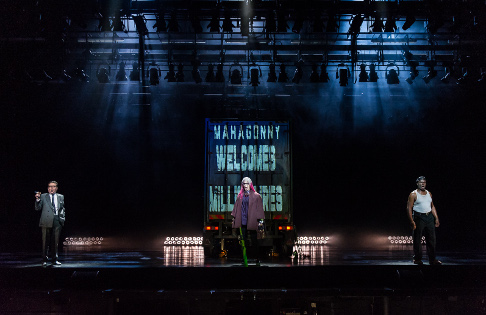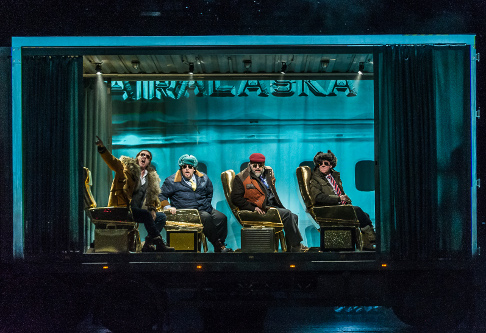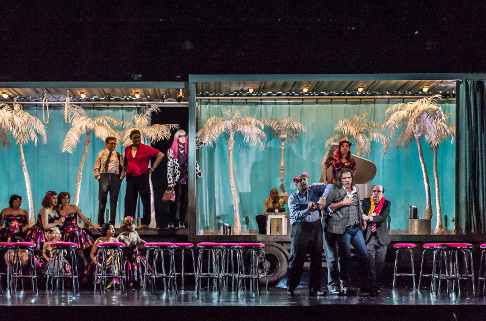The unresolved tension,
much of it fruitful, some of it perhaps less so, between Brecht and Weill, came
through loud and clear in this estimable performance, given in a new
translation by Jeremy Sams (which was certainly preferable to his
‘versions’ of Mozart, even if not entirely free of the translator’s habit
of drawing attention to himself rather than to the work). Is it an opera? Yes,
of course. As David Drew pointed out long ago, in a 1963 Musical Times
article, one of the most pernicious ideas about Mahagonny has been
‘one that menaces even the most generous-hearted listener — the idea that
Weill intended the work as an attack on the body of the operatic
convention by means of parody or an injected virus (jazz, cabaret etc.). This
idea is wholly false.’ As Drew continued, Weill had far too much knowledge of
and respect for the operatic repertoire, above all Mozart, but others too (not
least, and ominously for his collaboration with Brecht, Wagner), but he was
also genuinely excited by the new paths opened up by composers such as
Janáček and Stravinsky. (He was also a great defender of Wozzeck.)
The problem, for me, is that sometimes, though not always, the musical material
does not present the composer at his strongest; in general, and despite the
songs and tunes we know and love, I find him the more compelling the closer he
comes to his time with Busoni. The Second Symphony and Violin Concerto are
surely his masterpieces. Mahagonny’s music, however, remains on an
entirely different level from Weill’s disappointing music for the United
States. (Whatever his apologists may claim, that is surely, in aesthetic terms
at least, where he ‘sold out’.)
 Peter Hoare as Fatty; Anne Sofie von Otter as Leocadia Begbick; Willard W. White as Trinity Moses
Peter Hoare as Fatty; Anne Sofie von Otter as Leocadia Begbick; Willard W. White as Trinity Moses
The greater problem still, though, lies in the collaboration with Brecht,
whose strengths are quite different, and whose adamant refusal to
sentimentalise may sometimes be undone by Weill. (Not that Weill is sentimental
as such, but his æsthetic is undoubtedly different, less didactic,
unquestionably less concerned with alienation, more concerned perhaps with
‘opera’). It is no mean achievement of John Fulljames’s production of
this difficult, perhaps impossible, work, that Brecht’s stature as, after
Beckett, perhaps the greatest of twentieth-century playwrights comes across
with increasing immediacy. There is no attempt to make us ‘sympathise’,
although Weill sometimes does not help in that respect. The conceit, as with
that of the work itself, is admirably simple, though certainly not simplistic.
Mahagonny and Mahagonny grow from a splendidly designed lorry. The
accoutrements of capital, of ‘entertainment’, of neo-liberal barbarism
sprout necessarily: garishly, of course, but retaining focus. Voice-overs and
video projections do excellent work, Brecht’s placards reimagined for our
computer-screen-obsessed age. Perhaps the acting does not always convince as
strongly as it might as acting, but that is part of the trade-off between
Brecht and Weill: an immanent criticism as much as, perhaps more than, a
shortcoming. Choreography is sharp and to the point, for instance during the
‘Mandalay Song’, as the men of Mahagonny — and what an indictment for us
this is of male behaviour, the Widow Begbick notwithstanding! — await their
turn with the prostitutes. I wondered whether the Christ-like imagery at the
end was exaggerated, but to be fair, it is no more so than it is in the work.
Besides, we are at liberty to interpret God’s coming to Mahagonny as we will.
 Kurt Streit as Jimmy Macintyre; Jeffrey Lloyd-Roberts as Jack O’Brien; Darren Jeffery as Bank Account Bill; and Neal Davies as Alaska Wolf Joe
Kurt Streit as Jimmy Macintyre; Jeffrey Lloyd-Roberts as Jack O’Brien; Darren Jeffery as Bank Account Bill; and Neal Davies as Alaska Wolf Joe
For, in general, the action is non-specific enough for us to be able to
relate it to when and where seems most appropriate. (It would surely be
bizarre, if in our age of bankster-crime run truly riot, we did not think of
our own characters such as HSBC’s The Revd Prebendary Baron Green of
Hurstpierpoint, surely an invention who would have been too much, too
far-fetched, too agitprop, even for Brecht.) Price variations do their evil
work, and Fulljames, whilst not entirely ignoring the ‘American’ element,
does not overplay it. Weill was certainly alert to the danger of the work
seeming as if it were too much ‘about’ America, writing to his publisher:
‘The use of American names for Mahagonny runs the risk of
establishing a wholly false idea of Americanism, Wildwest, of such like. I am
very glad that, together with Brecht, I have now found a very convenient
solution … and I ask you to include the following notice in the piano score
and libretto,’ although, oddly, it would only appear in the full score, not
in the piano score: ‘“In view of the fact that those amusements of man
which can be had for money are always and everywhere exactly the same, and
because the Amusement-Town of Mahagonny is thus international in the widest
sense, the names of the leading characters can be changed into customary forms
at any given time. The following names are therefore recommended for German
performances: Willy (for Fatty), Johann Ackermann (for Jim), Jakob Schmidt (for
Jack O’Brien) [etc.]”.’ In an English-language version, we necessarily
tilt more towards Americana — the exhibitionist piano-playing of Robert Clark
is an especial joy! — but not too much. Moreover, whilst those of us with
Lotte Lenya in our mind’s ear, may miss her and the rest of the Wilhelm
Bruckner-Rüggeberg crew, we know that this is not a work to be confined to
nostalgic conceptions of Weimar culture.
Mark Wigglesworth is surely one of our most underrated conductors, although
let us hope his forthcoming tenure at ENO will change that; he conducted a
punchy, intelligently varied account. If I found the ‘Alabama Song’ a
little on the slow side, it was slow rather than sentimentalised. Weill’s
Neue Sachlichkeit generally won through, and where more typical
‘operatic’ impulses threatened Brecht’s conception, that suggested its
own humane rewards. Choral singing was well-drilled and not without
‘expressive’ quality: never too much, though. The chorales did their
formal, almost Stravinskian (think not least of The Soldier’s Tale)
work, reacting both with ‘tradition’ and with Brecht. There was certainly a
characterful, properly parodic sense of what Drew, in that Musical Times
article, called ‘the fairground banalities of the trial scene,’
likewise of the horrifying ‘stormtrooper tunes of the boxing scene’. Where,
though, was the Crane Song? Everything is permitted, of course, its omission
certainly so, but it seemed a pity. We should at any rate be grateful that the
once-popular ‘Paris version’, a travesty, with no warrant from Weill, in
which songs from the Songspiel were interspersed with a few
instrumental pieces from the opera, is no longer favoured.
 Peter Hoare as Fatty; Willard W. White as Trinity Moses; Anne Sofie von Otter as Leocadia Begbick; Jeffrey Lloyd-Roberts as Jack O’Brien; Christine Rice as Jenny; Kurt Streit as Jimmy Mcintyre; Neal Davies as Alaska Wolf Joe
Peter Hoare as Fatty; Willard W. White as Trinity Moses; Anne Sofie von Otter as Leocadia Begbick; Jeffrey Lloyd-Roberts as Jack O’Brien; Christine Rice as Jenny; Kurt Streit as Jimmy Mcintyre; Neal Davies as Alaska Wolf Joe
The tension between Brecht and Weill was perhaps most clear in the vocal
performances. How to approach these roles as opera singers, in so large a
theatre? For the most part, the cast coped well enough; if their performances
fell somewhat uneasily between (at least) two stools, then perhaps that is
unavoidable in a presentation of the work so conceived. Willard White balanced
gravity and sleaze as Trinity Moses. Kurt Streit as Jimmy had his lyrical
moments — but also, alas, his moments of would-be lyricism. Christine
Rice’s Jenny veered uneasily between home-spun Oklahoma and operatic vibrato,
but her transformations were not so blatant as those of Anne Sofie von
Otter’s Widow Begbick. Stylistically, she was all over the place, but I
assume that in some sense was the point. In any case, the whole, as the cliché
has it, was more than the sum of its parts.
At the time of its first performance, Adorno’s was one of the few critical
voices raised in favour of the work: ‘Apart from the diametrically opposed
operas of the Schoenberg school, I know of no work better or more strongly in
keeping with the idea of the avant-garde than Mahagonny … Despite
and on account of the primitive façade, it must be counted among the most
difficult works of today.’ That difficulty may have lessened, as indeed has
that of Wozzeck or Von heute auf morgen — now when shall we
see that in London? — but it remains, the chill with which Brecht and Weill
react against each other perhaps no less than ever.
Mark Berry
Cast and production information:
Leocadia Begbick: Anne Sofie von Otter; Fatty: Peter Hoare; Trinity
Moses: Sir Willard W. White; Jenny: Christine Rice; Six Girls: Anna Burford,
Lauren Fagan, Anush Hovhannisyan, Stephanie Marshall, Meeta Ravel, Harriet
Williams; Jimmy McIntyre: Kurt Streit; Jack O’Brien: Jeffrey Lloyd-Roberts;
Bank-Account Bill: Darren Jeffery; Alaska Wolf Joe: Neal Davies; Bar Pianist:
Robert Clark; Toby Higgins: Hubert Francis; Voice: Paterson Joseph. Director:
John Fulljames; Set designs: Es Devlin; Costumes: Christina Cunningham;
Lighting: Bruno Poet; Video: Finn Ross; Choreography: Arthur Pita. Royal Opera
Chorus (chorus master: Renato Balsadonna)/Orchestra of the Royal Opera
House/Mark Wigglesworth (conductor). Royal Opera House, Covent Garden, London,
Tuesday 10 March 2015.
![Christine Rice as Jenny [Photo © ROH by Clive Barda]](http://www.operatoday.com/150305_0156%20mahagonny%20adj%20Christine%20Rice%20as%20Jenny%2C%20Rise%20and%20Fall%20of%20the%20City%20of%20Mahagonny%20%28c%29%20ROH.%20photo%20by%20Clive%20Barda.jpg)


